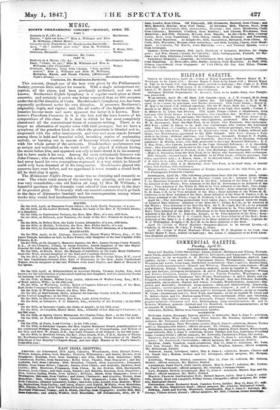MUSIC.
FOURTH PHILHARMONIC CONCERT-MONDAY, APRIL 26.
PART t.
Sinfonia in F, (No. 8,) Beethoven. Duette, " Quis eat homo ?" Miss A. Williams and Miss M. Williams, (Sktbat Mater) Rossini.
Concerto in G. Pianoforte, Dr. Mendeissohn-Bartholdy Beethoven.
Ana, " Ah ! rendirril quel core," Miss al. Williams,
(Mitraue) F. Rossi, 1686.
Overture, Eurijaathe Weber.
Conductor, Mr. costa. PART U.
&Weida in A Minor, (No. 3.) Mendeissohn-Bartholdy. Duet, "Come, be gay," thus N. Williams and Miss A.
Williams, (Der Frei/tattle) Weber. Overture, Scherzo, Song with Chorus, "You spotted intakes," Miss A. Williams and Miss M. Williams, Notturno, March, and Finale Chorus, (Midsummer Nights Dream) Mendeissohn-Bartholdy.
Conductor, Dr. Mendelssohn-Bartholdy.
This concert, though one of the best ever given by the Philharmonic Society, presents little subject for remark. With a single unimportant ex- ception, all the pieces had been previously performed, and are well known. Beethoven's Eighth Symphony is a regular stock-piece at these concerts; and certainly it never WAS better executed than on this occasion under the skilful direction of Costa. Mendelssohu's Symphony, too, has been repeatedly performed under his own direction. It possesses Beethoven's originality, depth, and vigour; and, like all works of the highest order, its beauties become more and more apparent the better it is known. Beet- hoven's Pianoforte Concerto in G is the last and the least known of his compositions of this class. It is that in which he has most completely abandoned all the conventional forms of concerto-writing. There is no longer an alternation of regular solos with tutti passages; but we have a symphony of the grandest kind, in which the pianoforte is blended and in- corporated with the other instruments, and ever and anon stands forward among them in bold and beautiful relief, breathing strains of enchanting melody, or bursting out in masses of harmony which contend in vigour with the whole power of the orchestra. Mendelssohn's performance was as unique and unrivalled as the work itself: he played it without having the musiebefore him, and appeared not only to have stored it in his memory but to have made it his own. Among the most enthusiastic listeners was John-Cramer; who observed, with a sigh, what a pity it was that Beethoven had never heard his own conceptions expressed in a way which he himself could only have dreamed of in his imagination. Mendelssohn played this concerto here once before, and we apprehend it must remain a closed book till he shall play it again.
The Midsummer Night's Dream music was as charming and romantic as ever. The whole vocal music of the evening was pleasing, and one piece was very remarkable,-the old Italian air sung by Miss M. Williams; a beautiful specimen of the dramatic vocal school of that country in the days of its greatest glory. We heartily wish our concert-caterers would go back to the days of Alessandro Scarlatti and his contemporaries, among whose works they would find inexhaustible treasures.


























 Previous page
Previous page